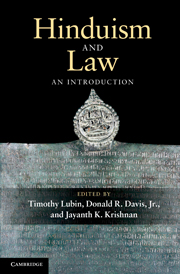Book contents
- Frontmatter
- Contents
- List of contributors
- Acknowledgements
- Chronology
- Abbreviations
- Map South Asia: political divisions c. 1860 and today
- Introduction
- Part I Hindu law
- Chapter 1 A historical overview of Hindu law
- Chapter 2 Dharmaśāstra
- Chapter 3 The practice of classical Hindu law
- Chapter 4 The creation of Anglo-Hindu law
- Chapter 5 Marriage and family in colonial Hindu law
- Chapter 6 Hindu law as personal law
- Part II Law in ancient and medieval Hindu traditions
- Part III Law and modern Hinduism
- Glossary
- Bibliography
- Index
Chapter 5 - Marriage and family in colonial Hindu law
Published online by Cambridge University Press: 05 June 2012
- Frontmatter
- Contents
- List of contributors
- Acknowledgements
- Chronology
- Abbreviations
- Map South Asia: political divisions c. 1860 and today
- Introduction
- Part I Hindu law
- Chapter 1 A historical overview of Hindu law
- Chapter 2 Dharmaśāstra
- Chapter 3 The practice of classical Hindu law
- Chapter 4 The creation of Anglo-Hindu law
- Chapter 5 Marriage and family in colonial Hindu law
- Chapter 6 Hindu law as personal law
- Part II Law in ancient and medieval Hindu traditions
- Part III Law and modern Hinduism
- Glossary
- Bibliography
- Index
Summary
The title of this chapter suggests a particular approach to the study of law, in which legal systems are examined for their treatment of a given subject, for example, race in American law, lunacy in medieval French law, or, in this case, marriage and the family in colonial Hindu law. While I will certainly provide such an analysis, I propose to do so through a somewhat different exploration: of marriage and family as colonial Hindu law. Marriage and family formed the core of colonial Hindu law both within contemporary legal scholarship and in the actual adjudication of the courts. Attending to this centrality of the family enables a more serious reflection both on the system of colonial Hindu law as a component of the modern colonial state, and on its implications for those who were subject to its jurisdiction. Ultimately, the colonial state’s construal of Hindu law (as well as Muslim law) as primarily law of the family formed part of broader eighteenth- and nineteenth-century Western reformulations of the family and of religion as distinct from – and as objects of – state power. In the colonial context, religious law integrated aspects of Indian nomos, but it treated those elements as fundamentally external to the overarching values, principles, and beliefs of the state. This disjuncture led to the apotheosis of a paradoxical conceptualization of “Hindu law” as at once a narrow domain of “private” indigenous concerns inessential to matters of state interest, and as a morally and politically volatile arena that demanded state protection, attention and at times intervention.
If colonial religious law (also called “personal” law) was defined as essentially family law, however, this law primarily concerned the property rights and entitlements that the relations of family entailed. This centrality of property within colonial personal law linked it to the broader foundational connections that prevailed in British legal and political thought between property and legal capacity. Accordingly, the foundational assumptions of liberal thought came to pervade personal law, with the capacity to hold property and equal rights to property coming to signify autonomy, equality, and full legal subjecthood. In this context, because colonial personal law construed Hindus and Muslims, men and women, as different kinds of legal subjects with divergent rights and statuses enforced by the state, the rights of property and personhood within personal law became a critical idiom for new political claims.
- Type
- Chapter
- Information
- Hinduism and LawAn Introduction, pp. 89 - 104Publisher: Cambridge University PressPrint publication year: 2010
- 1
- Cited by

